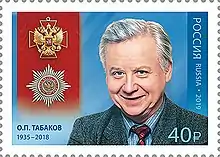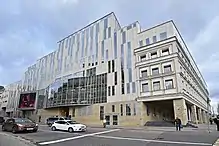Oleg Tabakov
Oleg Pavlovich Tabakov (Russian: Олег Павлович Табаков; 17 August 1935 – 12 March 2018) was a Soviet and Russian actor and the Artistic Director of the Moscow Art Theatre.
Oleg Tabakov | |
|---|---|
_06.jpg.webp) Tabakov in 2015 | |
| Born | Oleg Pavlovich Tabakov 17 August 1935 |
| Died | 12 March 2018 (aged 82) |
| Occupation | Actor, theatre director, pedagogue |
| Years active | 1956–2018 |
| Title | People's Artist of the USSR (1988) |
| Spouse(s) | Lyudmila Krylova
(m. 1960; div. 1994) |
| Children | |
| Awards | |
| Website | tabakov.ru |
Biography
Tabakov was born in Saratov into a family of doctors.[1] His paternal great-grandfather, Ivan Ivanovich Utin, came from serfs and was raised in a wealthy peasant family under the Tabakov surname. His grandfather, Kondratiy Tabakov, worked as a locksmith in Saratov where he built himself a house and married a local commoner Anna Konstantinovna Matveeva. Oleg's father, Pavel Kondratievich Tabakov, worked at the State Regional Research Institute of Epidemiology and Microbiology "Microbe" in Saratov.[2]
His maternal grandfather, Andrei Frantzevich Piontkovsky, was a Polish nobleman who owned lands in the Podolia Governorate and married a local villager, Olga Terentievna (surname unknown) of Ukrainian origin.[3] Oleg's mother, Maria Andreevna Berezovskaya (née Piontkovskaya), was a radiologist. She had a daughter Mirra from the previous marriage to Gugo Goldstern, a high-ranking Soviet functionary and intelligence officer killed in the line of duty.[2][4]
During the Great Patriotic War, Oleg's father volunteered for the frontline and served aboard a hospital train while his mother was evacuated to Ural along with children where she also worked in a military hospital. After the war, the parents separated.[2][5]
Theatre career
Tabakov studied at the Moscow Art Theatre School. Upon graduating, he became one of the founding fathers of the Sovremennik Theatre. He administrated the Sovremennik until 1982, when he moved to the Moscow Art Theatre, where he has played Molière and Salieri for over 20 years. In 1986, Tabakov persuaded his students to form the Tabakov Studio attached to the Moscow Art Theatre. Several notable Russian actors, including Yevgeny Mironov, Sergey Bezrukov, Vladimir Mashkov, Andrey Smolyakov and Alexandre Marine, studied at the studio. Tabakov also worked in numerous foreign countries, spreading his theatre's ideals abroad.
Film career
Tabakov's movie career paralleled the theatrical. He was featured in Grigori Chukhrai's Clear Skies (1961), Sergei Bondarchuk's War and Peace (1966–67), TV series Seventeen Moments of Spring (1973) and D'Artagnan and Three Musketeers (1978), the Academy Award-winning Moscow Does Not Believe In Tears (1980), Nikita Mikhalkov's Oblomov (1981) and Dark Eyes (1986), and the mock red western A Man from the Boulevard des Capuchines (1987), among others.
Voice-over work
Tabakov has lent his distinctive, purr-like voice to a number of animated characters, including the talking cat Matroskin in Three from Prostokvashino and its sequels. After the Matroskin role, he dubbed the character of Garfield into Russian in the feature film Garfield.
Political activism
During the 2012 Russian presidential election, Tabakov was registered as a "Trusted Representative" (Доверенное Лицо) of Vladimir Putin.[6]
In March 2014, he signed a letter in support of the position of the President of Russia Vladimir Putin on Russia's military intervention in Ukraine.[7] In September 2014, Tabakov claimed that Crimea has no relation to Ukraine and upbraided Ukrainians for discussing it: "But all happened fairly. If our Ukrainian brothers were smarter, they would not discuss that topic. They had to say: "Forgive us for God's sake! We had encroached the gravy train." Because Crimea has no relation to dependent, nor independent Ukraine."[8] Crimea is, since March 2014, under dispute by Russia and Ukraine.[9]
Honours and awards


- Order of Merit for the Fatherland;
- 1st class (17 August 2010) – for outstanding contributions to the development of domestic theatrical art and many years of creative activity
- 2nd class (17 August 2005) – for outstanding contribution to the development of theatrical art, and many years of creative activity
- 3rd class (23 October 1998) – for many years of fruitful work in the field of theatrical art, and in connection with the 100th anniversary of the Moscow Art Theatre
- 4th class (29 June 2015)
- Order of Friendship of Peoples (10 November 1993) – for his great personal contribution to the development of theatrical art, and training qualified personnel for theatre and film
- Order of the Red Banner of Labour (USSR, 1982)
- Order of the Badge of Honour (USSR, 1967)
- USSR State Prize (1967)
- State Prize of the Russian Federation (1997)
- People's Artist of the RSFSR (1977)
- People's Artist of the USSR (1988)
- Honorary Member of the Russian Academy of Arts (8 October 2008)
- Golden Mask Award (1995)
- Seagull Theatre Prize
- Crystal Turandot Award
- Russian Presidential Prize for Literature and the Arts (2003)
- Moscow Komsomol Prize (1967)
- Moscow Mayor's Award for Literature and the Arts (1997)
- Diploma of the Moscow City Duma (2008)
- Medal "For Valiant Labour" (Tatarstan, 2010)
- Honorary Citizen of the Republic of Mordovia (2010), Saratov Oblast (2010), City of Saratov (2003)
- Order "Key of Friendship" (Kemerovo Oblast, 2010)
- Medal "For Faith and Good" (Kemerovo Oblast, 2011)
- Order of the Cross of Terra Mariana, 3rd class (Estonia, 2005)
- Officer of the Legion of Honor (France, 2013)[10]
Selected filmography
- Sasha Enters Life (1957) as Sasha Komelev
- The Variegateds Case (1958) as Igor Peresvetov
- Nakanune (1959) as Shubin
- People on the Bridge (1960) as Viktor Bulygin
- Probation (1960) as Sasha Yegorov
- The Buzzy Day (1960) as Oleg
- Clear Skies (1961) as Seryozhka
- Molodo-zeleno (1962) as Nikolai Babushkin
- The Alive and the Dead (1964) as Krutikov
- War and Peace (1965–1967, part 1-4) as Nikolai Rostov
- Doroga k moryu (1965) as Chemezov
- The Bridge Is Built (1966) as Sergei Zaytsev
- A Pistol Shot (1967) as Belkin
- Shtrikhi k portretu (1967) as Nikolai Bukharin
- Korol manezha (1970)
- Shine, Shine, My Star (Gori, gori, moya zvezda) (1970) as Vladimir Iskremas
- The Secret of the Iron Door (1970) as Father
- King Stag (1970) as Cigolotti
- The Polynin Case (1970) as Viktor Balakirev
- Serdtse Rossii (1970) as Usiyevich
- Property of the Republic (1972) as Makar Ovchinnikov
- Ekhali v tramvaye Ilf i Petrov (1972)
- Malchiki (1972) (uncredited)
- Dacha (1973) as Yuri
- Seventeen Instants of Spring (1973, TV Series) as Walter Schellenberg
- Menyayu sobaku na parovoz (1975) as The Director
- Mark Twain Says No (1975, TV Movie) as Mark Twain
- How Czar Peter the Great Married Off His Moor (1976) as Yeguzhinskiy
- Practical Joke (1977) as otets Komarovskogo
- An Unfinished Piece for Mechanical Piano (1977) as Pavel Petrovich Shcherbuk
- Lone Wolf (1978) as Bersenev
- Three from Prostokvashino (1978, Short) as Matroskin the Cat (voice)
- Nakanune premiery (1978) as Patov
- D'Artagnan and Three Musketeers (1979, TV Mini-Series) as King Louis XIII
- Moscow Does Not Believe In Tears (1980) as Vladimir, Katerina's lover
- A Few Days from the Life of I. I. Oblomov (1980) as Ilya Ilyich Oblomov
- Nezvanyy drug (1981) as Aleksey Grekov
- The Vacancy (1981) as Yusov
- Everything's the Wrong Way (1982) as Yermakov, papa
- Polyoty vo sne i nayavu (1983) as Nikolay Pavlovich
- Good Bye, Mary Poppins (1984, TV Movie) as Miss Andrew
- Oglyanis!... (1984) as Yuriy Nikolayevich
- Yesli mozhesh, prosti... (1984) as Stepan Kuzmich
- Time and the Conways (1984) as Robin (Adult)
- Kukacka v temném lese (1985) as Otto Kukuck
- Applause, Applause... (1985) as Sergey Shevtsov
- Gorod nevest (1985) as Reutov
- Korabl prisheltsev (1985) as Constructor
- After the Rain, on Thursday (1985) as Koschei the Immortal
- Puteshestviye gospodina Perrishona (1986) as Perrishon
- Konets sveta s posleduyushchim simpoziumom (1987) as Paul Cohen
- Dark Eyes (1987) as Sua Grazia
- A Man from the Boulevard des Capuchines (1987) as Harry
- Raz, dva - gore ne beda (1988) as Czar Ivan
- Dorogoe udovolstvie (1988) as Syoma
- Shag (1989) as Tutunov
- Love with Privileges (1989) as Nikolay Petrovich, KGB General
- Iskusstvo zhit v Odesse (1989) as Tsudechkis
- It (1989) as Brudasty
- Tsarskaya okhota (1990) as Golitsyn
- Shapka (1990) as Andrey Andreyevich Shchupov
- The Inner Circle (1991) as Vlasik
- Choknutye (1991)
- Khochu v Ameriku (1993)
- Moscow Vacation (1995) as Maurizio
- Shirli-Myrli (1995) as Sukhodrishchev
- Belye dyuny (1996)
- Three Stories (1997) as Old Man
- Sympathy Seeker (1997) as Cook
- Quadrille (1999) as Sanya Arefyev
- The President and His Granddaughter (2000) as President
- Podari mne lunnyy svet (2001)
- Taking Sides (2001) as Colonel Dymshitz
- Ledi na den (2002) as mayor of New York
- The State Counsellor (2005) as Prince Dolgoroukoy
- Yesenin (2005, TV Mini-Series) as KGB General Simagin
- Dopolnitelnoe vremya (2005)
- Relatives (2006) as Polgármester
- Andersen. Zhizn bez lyubvi (2006) as Meisling
- Ilya Muromets and Solovey Razboynik (2007) as Vasilevs (voice)
- Melodiya dlya sharmanki (2009)
- Yolki 2 (2011)
- Poklonnitsa (2012)
- Tot eshchyo Karloson! (2012) as Stareyshina Metrikov
- Vechnoe vozvrashchenie (2012)
- Buratino's Return (2013) as Mr. Baskara (voice)
- Kukhnya v Parizhe (2014)
- Kitchen. The Last Battle (2017) as Pyotr Barinov
References
- Genzlinger, Neil (23 March 2018). "Oleg Tabakov, Revered Russian Actor and Teacher, Is Dead at 82". The New York Times. Retrieved 30 March 2018.
- Oleg Tabakov, Anatoly Smelyanskiy (2000). My Real Life. — Moscow: Eksmo-Press, pp. 22—48 ISBN 5-04-005401-7 (Autobiography)
- Солнечная система Олега Табакова
- Interview at Echo of Moscow, 11 September 2004 (in Russian)
- Stage Worker interview from the Itogy magazine №36, 6 September 2010 ISSN 1027-3964 (in Russian)
- "Олег Табаков – о Путине, который вне конкуренции". Radio Liberty. 6 February 2012.
- "Деятели культуры России — в поддержку позиции Президента по Украине и Крыму". Ministry for Culture of Russian Federation. Archived from the original on 11 March 2014.
- Табаков ждет от «украинцев-халявщиков» извинений за Крым (in Russian). DePo. 9 September 2014
- Gutterman, Steve. "Putin signs Crimea treaty, will not seize other Ukraine regions". Reuters. Retrieved 26 March 2014.
- "Олег Табаков стал офицером Ордена Почетного легиона". ТАСС (in Russian). Retrieved 15 October 2020.
External links
| Wikimedia Commons has media related to Oleg Tabakov. |